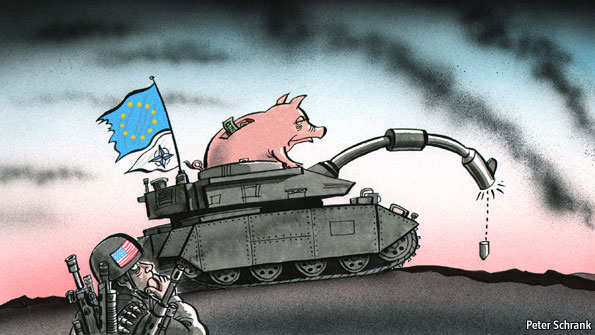
From Charlemagne, the Economist: Three months into the war in Libya, and confident talk of Muammar Qaddafi’s forces being broken by NATO’s bombs is being accompanied by worries that the alliance itself is feeling the strain of a prolonged campaign. The British naval chief says that, if the war drags on beyond the autumn, he will have to take “challenging decisions” about how to deploy his ships. His French counterpart complains that if his only carrier, the Charles de Gaulle, remains off Libya for the rest of the year it will have to be out of service for maintenance throughout 2012. Norway, one of the few stalwarts ready to bomb Colonel Qaddafi’s forces, says its small air force can no longer cope: it will cut back operations now, and cease them altogether on August 1st.
Yet it was a thunderous parting shot from Robert Gates, the outgoing American defence secretary, that most cruelly exposed Europe’s shortcomings. At the outset Europeans relied on the Americans to lead the operation in Libya. Now under NATO control, they still depend on America to identify targets and provide air-to-air refuelling. American experts were rushed in to boost NATO’s command centre in Naples. . . .
The underlying reason for these failings is no secret. Most Europeans spend too little on defence, and what they do is often wasted. . . .
Libya is a warning. America no longer expects to lead military action; even its backseat role is controversial at home. The southern Mediterranean should be of vital importance to Europeans. If they cannot act here, what is the point of their spending $275 billion on defence? In these days of austerity, Europeans will not suddenly spend more. But they could at least spare defence the biggest cuts—and they could co-ordinate better to ensure that NATO retains a balance of forces.
Now, more than ever, Europeans need to get more bangs for their bucks. They have more soldiers than America, but can deploy far fewer abroad. Their budgets are fragmented among lots of armies, navies and air forces. Europe produces 20 different kinds of armoured vehicles, six types of attack submarines and three of fighter jets. With the cost of military equipment rising faster than inflation, European countries plainly need to find greater economies of scale. This does not imply creating a European army, as some favour. That would be a recipe for paralysis: just try sending the Franco-German brigade to Afghanistan, let alone Libya. Instead Europeans need to specialise and, when they do similar things, they should pool equipment.
None of this is easy. Countries want neither to depend on others nor to be dragged into somebody else’s war. Some have defence industries to prop up. But Denmark has given up submarines, letting it play a bigger role in Afghanistan and Libya. Several countries share C-17 transport aircraft. Last year’s Franco-British defence pact points the way: the two countries will co-operate in, among other things, nuclear tests, aircraft-carrier operations and a joint expeditionary force, as well as unglamorous but vital support tasks. The lesson is clear: pool it or lose it. (graphic: Peter Schrank/Economist)
Image: economist%206%2018%2011%20Europe%20military%20failings.jpg
